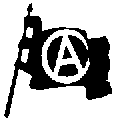US Black anarchist Lorenzo Komboa Ervin is speaking at meetings around Ireland this summer. Lorenzo is an ex-Black Panther who served 15 years in one of the worst US prisons. In prison he became an anarchist and has spent his time since helping to build the anarchist movement in the US. He has also continued striving to build a broad grassroots movement against racism and injustice. In bringing him over here we hope to broaden the understanding of anarchism among people in Ireland, and underline both its internationalism and relevance to today's struggles.
Lorenzo Komboa Ervin was born in Chattanooga, Tennessee in 1947. What he calls the "segregated South" was an environment of violence, racism, poverty and rejection. A youth street gang member, Ervin joined the National Association for the Advancement of Coloured People youth group when he was 12 years old and took part in the 1960 sit-in protests which challenged racial discrimination.
After being drafted and serving two years in the U.S. Army, (where he was a anti-Vietnam war organiser and was court-marshalled), he joined the Student Non-violent Co-ordinating Committee in 1967 shortly before it merged (temporarily) with the more militant Black Panther Party.
In the wake of the urban Black rebellions that rocked the U.S., after the assassination of Dr. Martin Luther King in the Spring of 1968, an attempt was made to frame Ervin on weapons charges and for planning to kill a local Ku Klux Klan leader.
In order to escape prosecution on these charges Ervin hijacked a plane to Cuba in February 1969. It was while in Cuba and later in Czechoslovakia, that he first became disillusioned with state 'socialism', recognising it as dictatorship period, not the "dictatorship of the proletariat", as various Stalinist governments claimed.
In Prague, Ervin was betrayed to U.S. officials. Briefly captured and held at the American Consulate, he fled to East Berlin where he was kidnapped by a team of American and West German special agents sent to recapture him.
He was drugged and tortured during interrogation in the basement of the U.S. Consulate for almost a week, and after almost dying from this mistreatment, he was illegally brought back to the USA where it was falsely announced by the State department and the FBI in a press conference that he had "turned himself in" at JFK airport.
After a farce of a trial in a small town in Georgia, where he faced the death penalty before an all-white judge, jury, prosecutor and defence attorneys (appointed by the court), he was sentenced to spend the rest of his life in prison. Ervin remained politically active in prison where he was first introduced to the ideas of Anarchism in the late 1970's.
He read many books on the subject sent by prison book clubs, and his case was adopted by the Anarchist Black Cross, an international prisoner support movement. Also in prison, Ervin wrote several Anarchist pamphlets that are probably the most widely read writings on anarchism and the Black liberation movement. 'Anarchism and the Black Revolution' is still popular, and has gone through several printings.
He was also involved in many prison struggles, the early 1970's prisoner union organising campaigns and the Black prisoner movement of that period.
Because of years of solitary confinement and prison mail censorship, his case was kept in obscurity, and it was not until he was one of the "Marion Brothers", a group of prisoners who became well known as they struggled against the first Control Unit at Marion Federal Penitentiary, that his case became a public concern. Ervin's own legal challenges and an international campaign eventually led to his release from prison after 15 years of incarceration.
After his release Ervin returned to Chattanooga, where for over ten years, he has been active with the Concerned Citizens for Justice, a local civil rights group, fighting police brutality and organising against the Ku Klux Klan. In 1987 Ervin helped organise a major mobilisation against the Klan that resulted in the hooded racists being run out of town.
Also in 1987, Ervin was primarily responsible for the filing of a major civil rights lawsuit that successfully forced the city of Chattanooga to change its structure of governance on the basis that it systematically disempowered the Black community. Ervin now lives in Atlanta, Georgia.
His current project is helping to build an "anti-authoritarian network of community organisers" all over North America.
